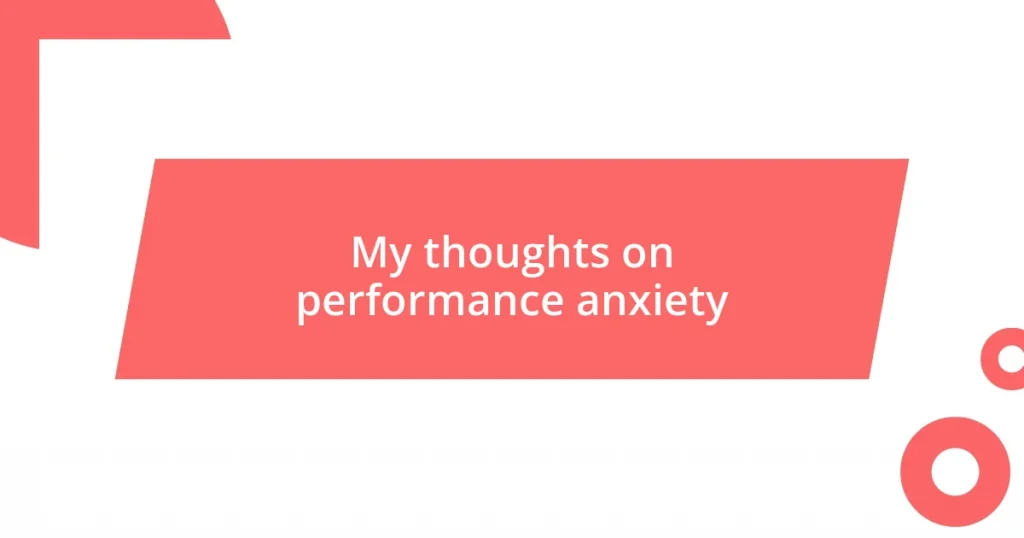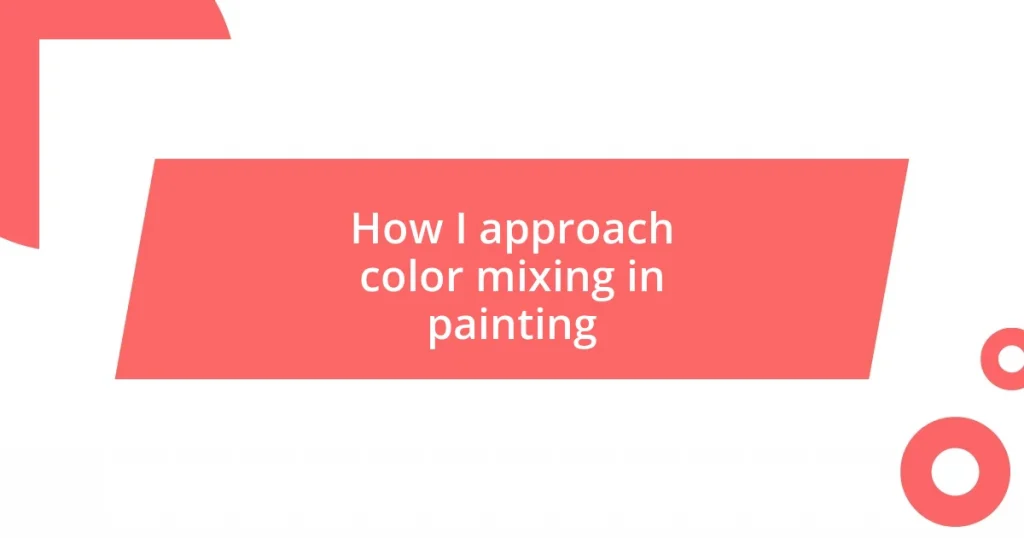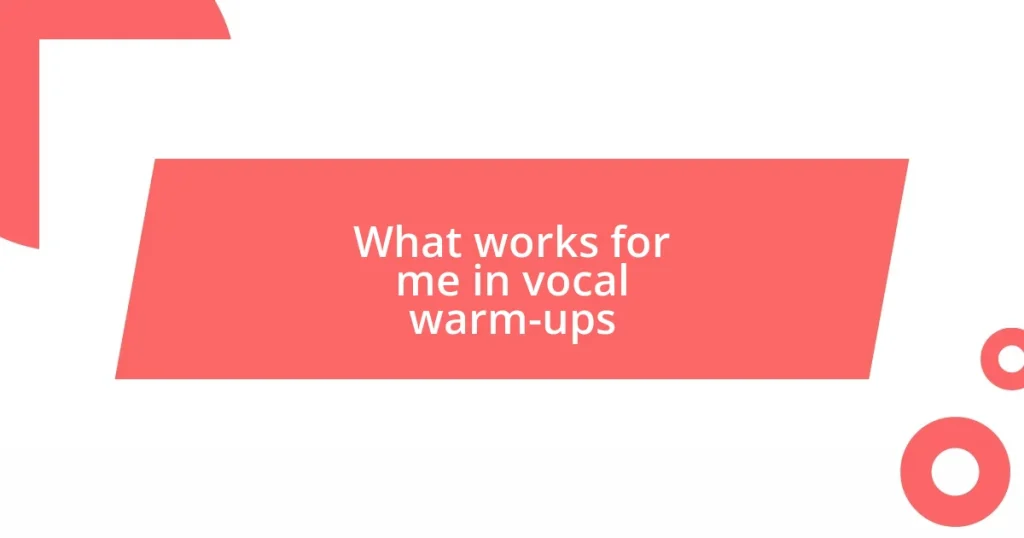Key takeaways:
- Performance anxiety arises from fear of judgment, lack of preparation, and perfectionism, which can exacerbate feelings of inadequacy.
- Effective management strategies include visualization, mindfulness techniques, and seeking support from peers, which can help transform anxiety into positive energy.
- Long-term confidence can be built through setting small goals, seeking constructive feedback, and embracing a growth mindset to reframe setbacks as learning opportunities.
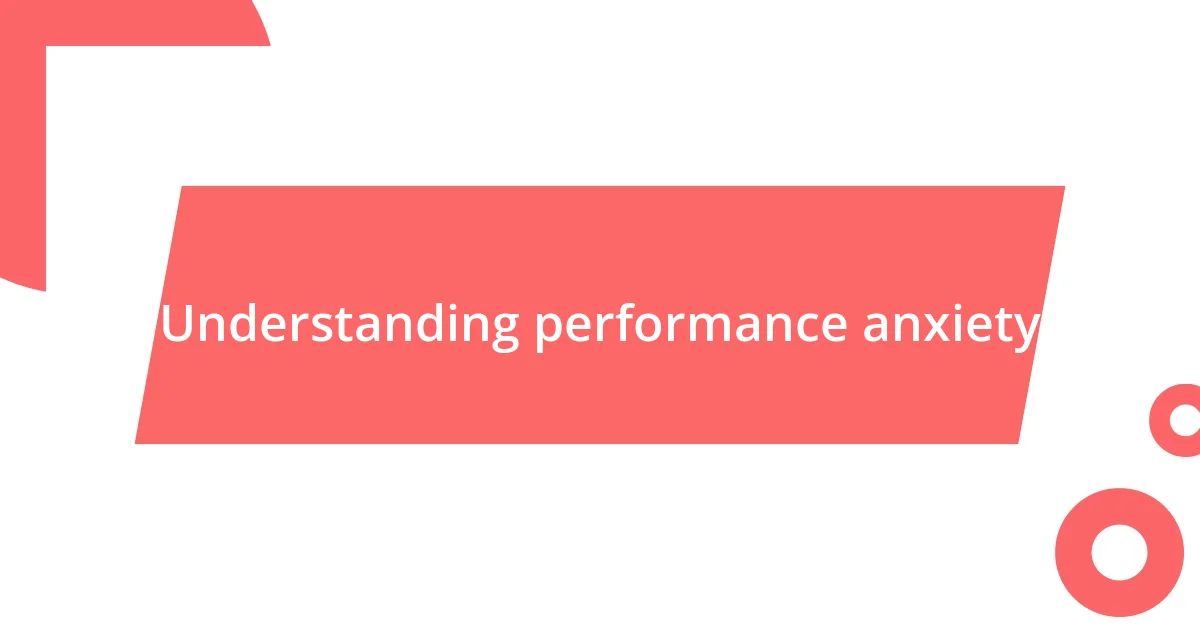
Understanding performance anxiety
Performance anxiety can feel like a heavy cloak draped over us when we’re about to present, perform, or even just share ideas. I remember standing in front of an audience, heart racing, palms sweaty, questioning whether they’d judge my every word. Have you ever felt like every eye in the room was fixed on you, ready to dissect your every move?
It’s fascinating how performance anxiety often comes from our internal narratives, the stories we tell ourselves about our worth and abilities. I’ve wrestled with the feeling that I needed to be perfect, which only amplified my anxiety. It’s as if the pressure to deliver flawlessly morphs into a self-fulfilling prophecy; the more I worried about not measuring up, the more I stumbled.
Understanding performance anxiety doesn’t just involve recognizing it but also acknowledging our shared humanity in these moments of vulnerability. Each time I’ve pushed through that initial wave of fear, I’ve discovered a sense of liberation on the other side. Have you felt that rush of relief after overcoming a daunting challenge? It’s in these experiences that we learn resilience and, gradually, how to manage that anxiety to harness it as a source of energy instead of letting it weigh us down.
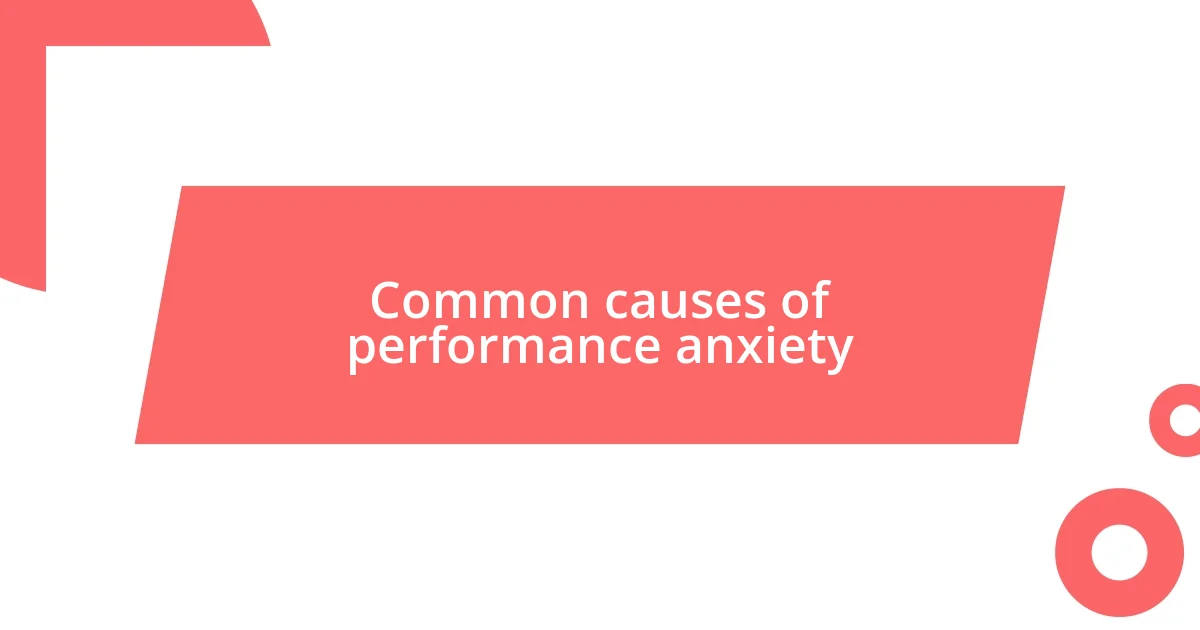
Common causes of performance anxiety
Performance anxiety often stems from a variety of common causes that shape our emotional responses. One significant factor is the fear of judgment. I remember preparing for an important presentation and worrying incessantly about what my colleagues would think. It felt like their opinions had the power to define my worth in that moment, escalating my anxiety to an unbearable level. Have you ever found yourself lost in thoughts of how others might perceive you?
Another prevalent cause is a lack of preparation. There was a time when I faced a performance without practicing adequately, and the panic set in like a tidal wave. The uncertainty of what might come next can trigger a sense of inadequacy that fuels anxiety. Preparation not only builds confidence but also serves as a safeguard against the fear of the unknown. Doesn’t it make sense to feel more in control when you know your material inside and out?
Lastly, perfectionism plays a pivotal role. I recall an experience where I placed immense pressure on myself to deliver a “perfect” performance. Instead of focusing on the message I wanted to convey, I was consumed with the minutiae details, which only aggravated my anxiety. Perfectionism drives us to create unrealistic standards, leaving us feeling vulnerable and exposed when we can’t meet them. Have you ever set impossibly high goals for yourself and felt crushed when you fell short?
| Common Causes | Emotional Impact |
|---|---|
| Fear of Judgment | Heightened anxiety, feelings of inadequacy |
| Lack of Preparation | Panic from uncertainty, vulnerability |
| Perfectionism | Pressure and increased self-doubt |
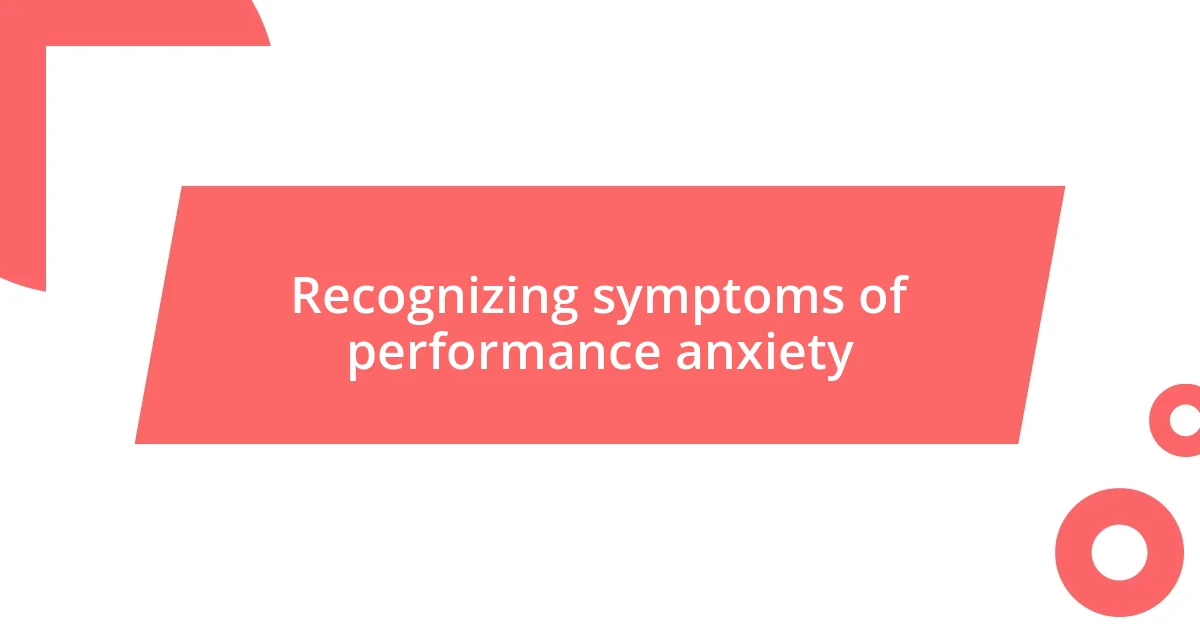
Recognizing symptoms of performance anxiety
Recognizing performance anxiety often involves paying attention to our bodies and thoughts. I vividly remember a time when I felt an overwhelming tightness in my chest right before stepping on stage. It was as if my body was signaling that something wasn’t right. Noticing these physical manifestations is essential because they can serve as early warning signals.
Here are some common symptoms to watch for:
- Rapid heartbeat: Similar to what I experienced, this can make you feel like your heart is racing out of control.
- Sweaty palms: A classic sign that anxiety is creeping in.
- Shaking or trembling: I’ve felt this when the pressure felt particularly intense.
- Dry mouth: It’s surprising how often this happens when anxiety hits.
- Negative self-talk: A diving spiral that questions your worth and abilities can overshadow your performance before it even begins.
By recognizing these symptoms early, we can start developing strategies to address them, rather than let them dictate our performance.
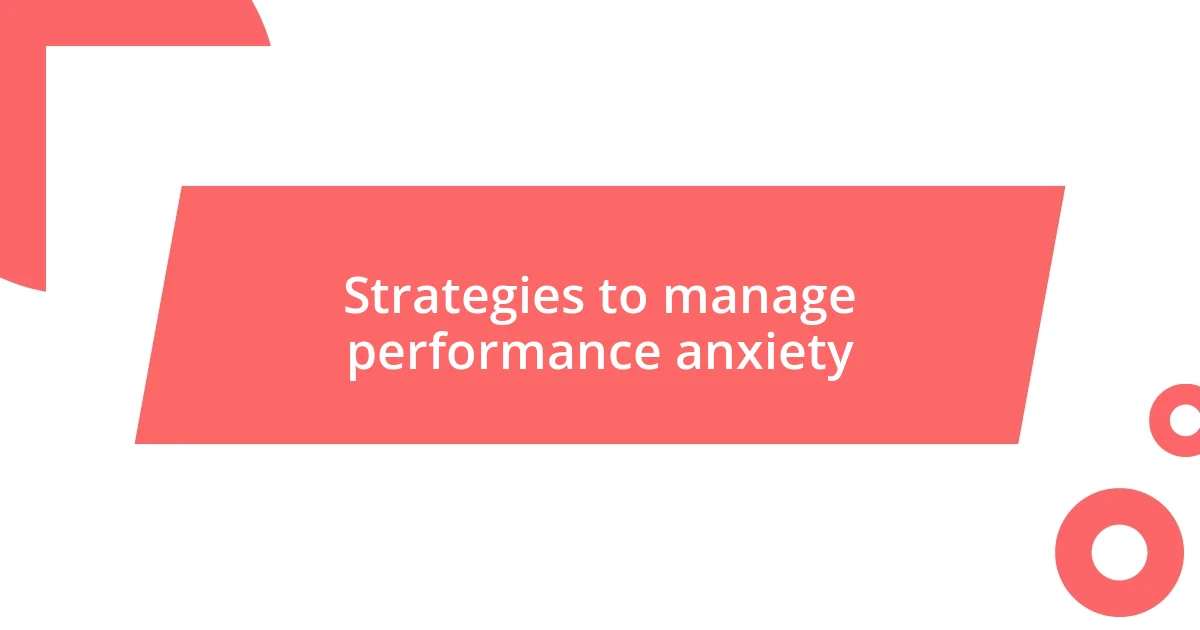
Strategies to manage performance anxiety
One effective strategy for managing performance anxiety that I’ve found impactful is visualization. Before stepping onto the stage or into a meeting, I often take a few moments to close my eyes and imagine myself succeeding. Picture this: I can see every detail—the confident expressions of my audience, the smooth delivery of my speech. This mental rehearsal not only calms my nerves but also primes my brain for actual success. Have you ever tried visualizing your triumph before a big moment? It’s fascinating how our minds can influence our feelings and actions.
Another method that has worked for me is practicing mindfulness techniques, like deep breathing or meditation. Whenever I feel anxiety bubbling up, I pause and focus on my breath. Inhale deeply for a count of four, hold for four, and exhale for four. This simple technique centers me and helps alleviate that knot in my stomach. I recall sitting backstage, about to present, and using this technique to regain my composure. Doesn’t it feel empowering to have a tool that can shift your mindset in an instant?
Finally, seeking support from friends or peers has proven beneficial. I’ve often reached out to a colleague before a presentation, sharing my jitters. Their encouragement and advice often remind me that I’m not alone in this. One time, a trusted friend shared their own struggles with performance anxiety, and that connection eased my burden considerably. Have you considered talking it out with someone? Sometimes, just verbalizing your fears can strip them of their power and transform anxiety into a shared experience.
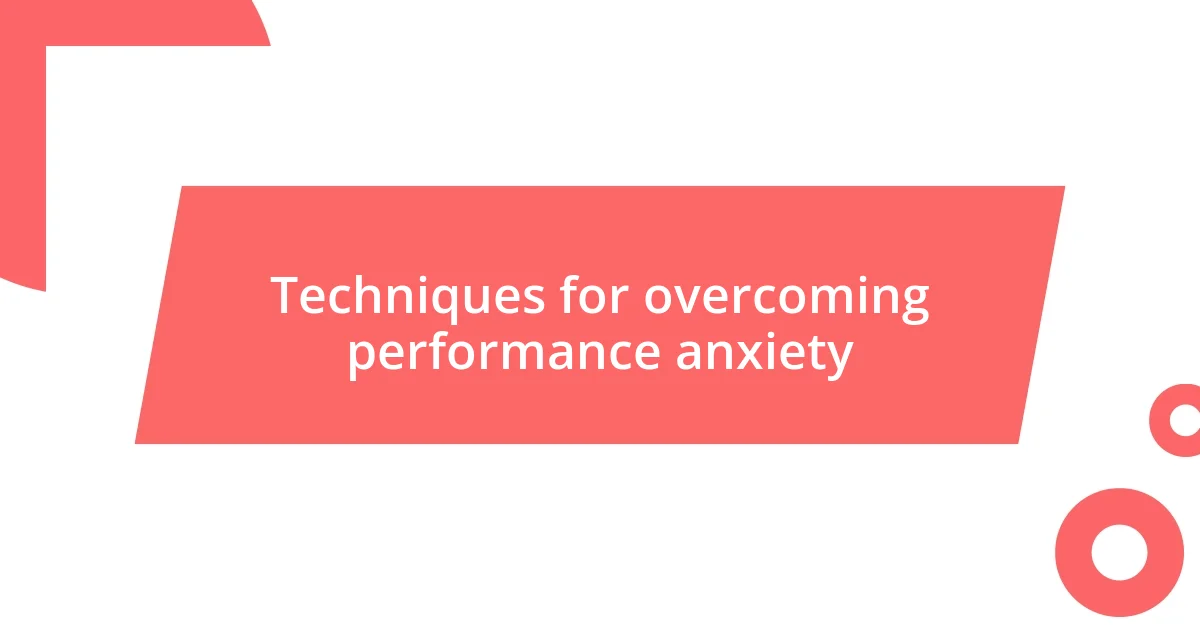
Techniques for overcoming performance anxiety
One technique that I’ve discovered really helps is preparation. I recall a time when I had to deliver a presentation. Instead of just winging it, I spent several days fine-tuning my material and practicing in front of a mirror. That dedication not only boosted my confidence but also made me feel more in control. Have you ever noticed how feeling prepared can transform overwhelming anxiety into a focused energy?
Another approach I use is positive affirmations. Before a big event, I like to remind myself of my capabilities with empowering statements like, “I am prepared, I am capable, and I will succeed.” There was one instance where I chanted these phrases in my car right before a critical meeting, and it sparked a boost in my self-belief. I find that these affirmations act like a shield against the negative thoughts that often try to creep in. Isn’t it fascinating how just a few positive words can shift our mindset?
Lastly, I swear by the power of physical activity. On days when anxiety feels particularly heavy, I make it a point to engage in a brisk walk or some yoga. A few weeks ago, after a stressful rehearsal, I stepped outside and did a quick jog around the block. The endorphins swept away much of my anxiety, leaving me feeling lighter and more focused. Have you ever experienced that rush of energy that comes from moving your body? It’s a reminder that sometimes, the best antidote to anxiety can be found in simply getting up and moving.
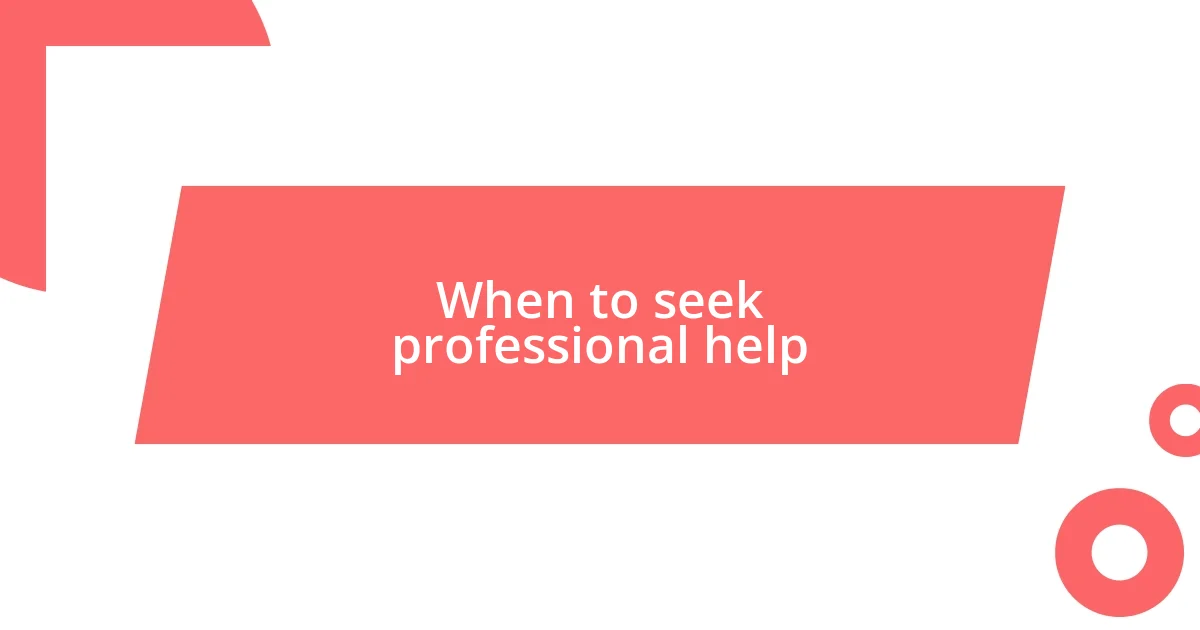
When to seek professional help
Recognizing when to seek professional help for performance anxiety can be tricky. I remember a time when my anxiety escalated so much that it started affecting my daily life—like avoiding social situations or dreading work presentations. It’s crucial to pay attention to those signs; if anxiety is disrupting your routine or causing you significant distress, that’s a clear indicator that professional support might be beneficial.
It’s also worth noting that if you’ve tried various self-help strategies without any success, reaching out for professional guidance can open up new avenues for growth. I once felt stuck in a cycle of anxiety, feeling like I’d hit a wall despite my best efforts. A therapist helped me uncover deeper issues and provided tools I hadn’t considered before. Have you considered how a professional could help you see things from a different angle? Sometimes an outside perspective can be enlightening.
Lastly, if you find yourself experiencing physical symptoms—like rapid heartbeat or panic attacks—due to performance anxiety, it’s time to talk to someone who can help. I had a particularly overwhelming moment where my heart raced so fast I felt like I might faint during a major presentation. Seeking help not only provided relief but also gave me actionable strategies that made a noticeable difference in my life. Isn’t it comforting to know that professional support is available when you need it most?
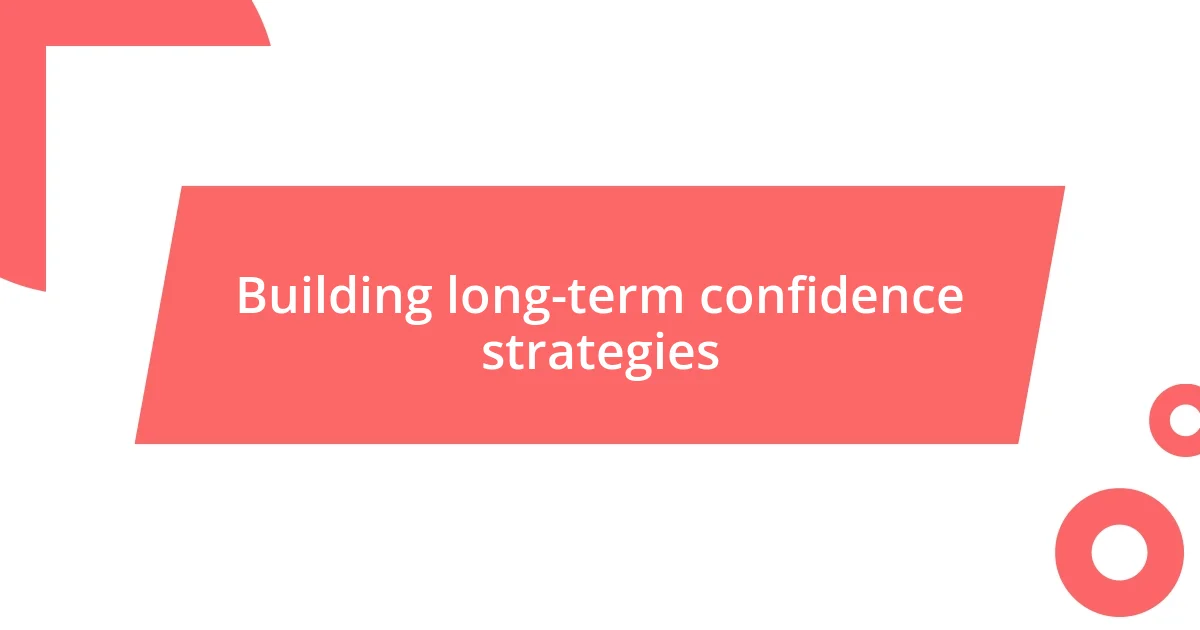
Building long-term confidence strategies
Building long-term confidence strategies is all about cultivating a mindset that encourages growth. I often reflect on the value of setting small, achievable goals. For instance, when I decided to join a public speaking group, I started by volunteering to introduce myself. That seemingly minor step allowed me to gradually build my confidence as I faced larger challenges. Have you considered how starting small can lead to significant changes over time?
Another strategy I’ve found effective is seeking constructive feedback from trusted sources. Early in my career, I was hesitant to ask for opinions, fearing criticism. But when I finally mustered the courage to invite a colleague for a chat about my presentation skills, it was enlightening! Listening to their insights not only helped me improve but also gave me a renewed sense of capabilities. What sparks can you find when you actively invite others into your journey of self-improvement?
Moreover, embracing a growth mindset has been pivotal for me. I vividly recall a time when I faced a disappointing performance and felt crushed. Instead of getting stuck in self-doubt, I decided to analyze what went wrong and treat it as a learning experience. This shift in perspective turned my failures into stepping stones for success. It’s interesting how reframing setbacks can be a profound source of strength, don’t you think?










